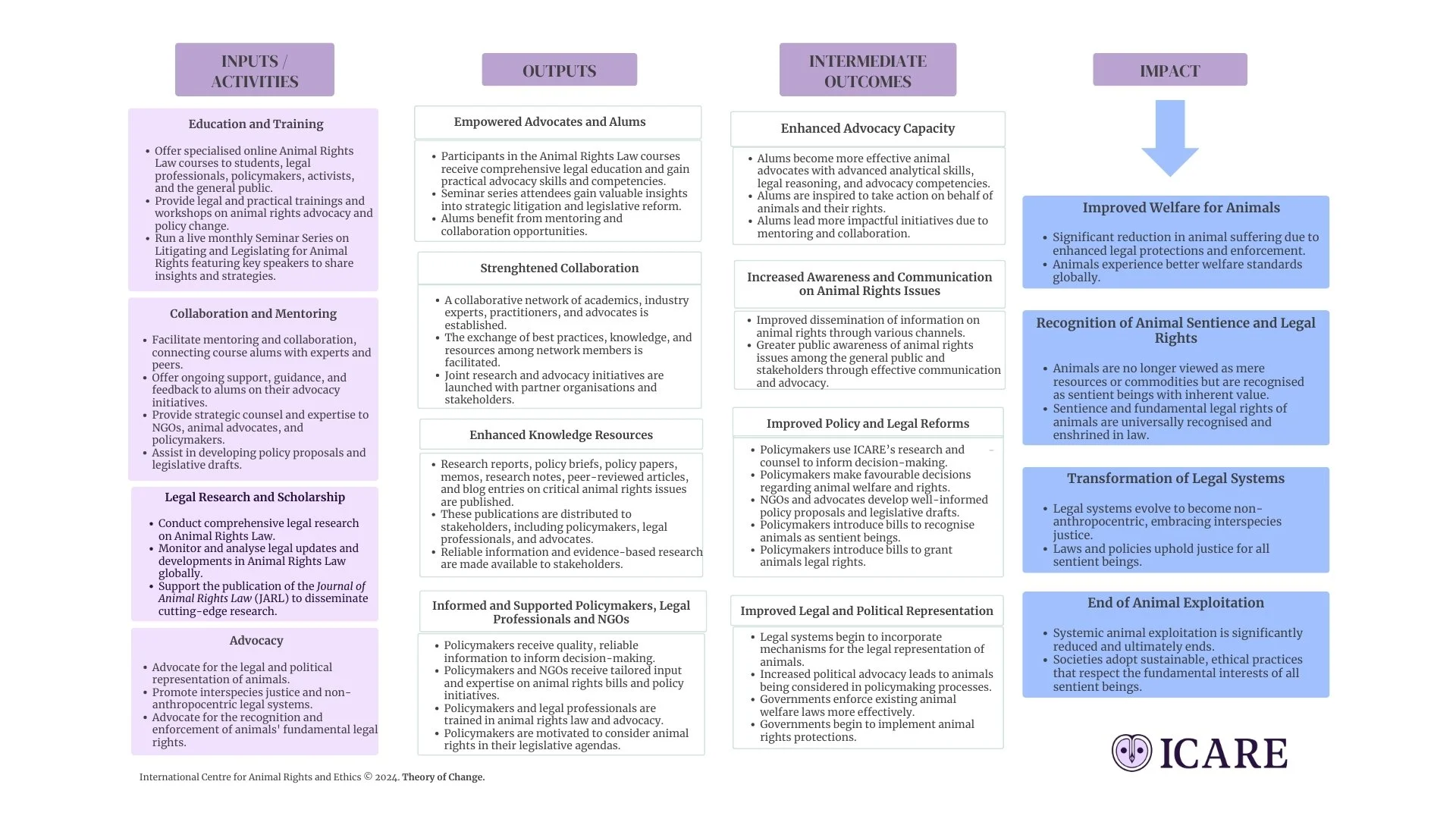
Our Theory of Change
At ICARE, our mission to end animal exploitation and advocate for the universal recognition of animals' legal rights is guided by a comprehensive Theory of Change.
Operating Context and Key Considerations
We start from the assumption that knowledge, skills, scholarship, and effective communication are critical to strengthening legal and political animal advocacy. This is essential given the current societal norms that view non-human animals as resources, commodities, and goods within anthropocentric legal systems and speciesist values.
To effectively realise our mission of ending animal exploitation and advocating for the universal recognition of animals' legal rights, we operate within a complex global, political and legal environment. Our Theory of Change is built upon key assumptions and is influenced by external factors that shape our strategies and impact our outcomes. Recognising these elements allows us to remain adaptive, resilient, and strategic in our approach.
Key Assumptions
There is a receptive audience among legal professionals, policymakers, and the public for animal rights issues.
Trained advocates will actively engage in advocacy efforts.
Our alums will seek and utilise guidance from experts within ARVAN to enhance their advocacy initiatives.
Collaboration enhances the effectiveness of advocacy initiatives.
Partnerships with stakeholders will enhance the effectiveness of advocacy efforts, maximising our collective impact.
Policymakers are willing to consider and adopt evidence-based recommendations.
Policymakers and NGOs are open to receiving and applying strategic counsel from ICARE, leading to effective policy development.
There is a growing global commitment to recognising animal rights and willingness to reform legal systems accordingly.
External Factors
Political climates and cultural attitudes may affect the receptiveness to animal rights advocacy.
Political leadership and international relations changes may affect the willingness to adopt animal rights legislation.
Economic interests tied to animal exploitation industries and opposition from these industries may resist change.
Societal values and traditions may influence the acceptance of non-anthropocentric legal systems.
Global events, environmental crises, pandemics and economic cutdowns can influence priorities and resource allocation, impacting our initiatives.
Our Values
Our work is rooted in the core values of compassion, justice, empathy, respect for all sentient beings, collaboration, and integrity. We recognise the importance of every animal life and are committed to promoting societies where the rights of animals are protected.
We embrace intersectionality and believe that empathy and concern for the well-being of each individual are fundamental to creating a just society. We strive for justice and equity by working to eliminate discrimination and establishing legal systems that protect the rights and welfare of all sentient beings, human and non-human alike. Recognising the importance of every sentient animal life, we are dedicated to promoting interspecies justice through anti-anthropocentric legal frameworks.
Integrity and transparency are at the core of our operations. We conduct our actions and research with honesty, openness, and responsibility, and we are committed to clear communication of our objectives, methods, and results. We value collaboration and inclusion, uniting individuals, communities, and organisations around our common cause. By fostering a collaborative environment that respects diverse perspectives and approaches, we aim to maximise the impact of our collective efforts.
We embrace the concepts of One Health and One Welfare, recognising that the health and well-being of humans, animals, and ecosystems are interconnected. By promoting initiatives that foster a healthy and balanced environment for all, we adopt a holistic approach to advocacy.
At the heart of our mission is the belief in the importance of mental well-being and inclusivity for all individuals involved in Animal Rights Law. We support practices and policies that promote mental and emotional health, acknowledging that physical and mental well-being are inseparable. This understanding guides our approach to advocacy and education, ensuring that our initiatives consider the holistic health of all beings, human and non-human.
Through these values, ICARE is dedicated to empowering individuals with the knowledge and skills to advocate for the legal and political representation of animals. We aim to build a robust network of skilled advocates capable of collaborating globally to effect systemic, policy, and legal changes—with care.
Aligned with the United Nations Sustainable Development Goals (SDGs), we acknowledge the interdependence of human and animal well-being and environmental sustainability.
Good Health and Well-being
(SDG 3)
Promoting practices that ensure the well-being of all, preventing zoonoses and supporting sustainable and ethical food systems.
Quality Education
(SDG 4)
Providing educational programmes that encourage understanding of ethical coexistence between humans and animals. Education is key to building peaceful and just societies for all sentient beings.
Responsible Consumption and Production (SDG 12)
Advocating for production and consumption practices that respect animal welfare and rights, contributing to sustainable models.
Climate Action (SDG 13)
Promoting practices that minimise environmental impact, enhance ecosystem resilience, and decrease our emissions, notably by transforming our food systems, to limit global warming and climate disasters.
Life Below Water (SDG 14)
Protecting aquatic life by respecting the rights of aquatic animals and combating marine pollution and habitat destruction.
Decent Work and Economic Growth (SDG 8)
Promoting decent work for all sentient beings by advocating for animal labour rights, supporting inclusive and sustainable economic growth that respects animal welfare, and ensuring safe and secure working environments and social protection for animals involved in labour. We emphasise that industries and practices harming animals often also harm and oppress humans, highlighting the interconnectedness of human and animal welfare in pursuing just and equitable labour conditions.
Life on Land (SDG 15)
Preserving natural habitats, ecosystems, and biodiversity, recognising the right of all animals to live in a healthy environment, by shifting our relationship with nature and the other animals with whom we share this planet.
Peace, Justice, and Strong Institutions (SDG 16)
Advocating for animal rights in legal frameworks, supporting the development of peaceful, just and inclusive societies, and promoting access to justice for all sentient beings.







